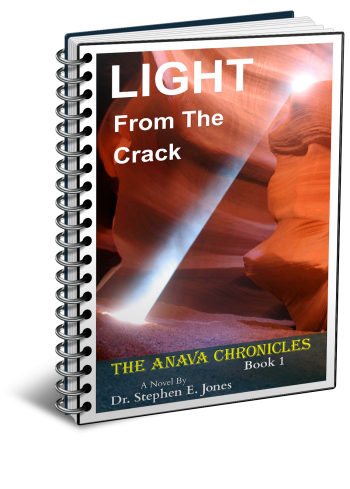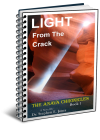Latest Posts
View the latest posts in an easy-to-read list format, with filtering options.

A man named Anava discovers a light in a cave that he is exploring, and has an encounter with the Creator. The revelation he receives sends him on a mission to bring light to others. This is a novel designed to teach biblical principles.
Category - Biblical Novels

I was awakened by what appeared to be a quick blast of a trumpet. As I stumbled out of bed, I could not be sure if I had heard the trumpet in a dream or if someone had blown it somewhere outside of the lodge. The darkness was just starting to be ushered away by its eastern gatekeepers.
“Did you hear that?” my wife asked.
“Yes, did you?” I responded.
“Yes.”
We both knew then that we had heard something, and we hurriedly dressed and descended the staircase to the lounge area. I strode toward the front door, pushed it open, and stepped outside into the cool, dark silence. As I passed through the doorway, I felt a strange sensation, and glancing at my wife, I saw that she felt it as well. Then we noticed that our clothing had changed, and that we were suddenly both dressed in white.
It was as if we had broken through a membrane separating one world from another. This new world was still dimly lit, but the landscape appeared to be different—more alive than normal. The trees swayed without a breeze and whispered to each other. There seemed to be pale shadows gliding among the trees. As we stood on the porch of the lodge surveying our surroundings, a wolf emerged from the forest with a lamb confidently walking close beside it. 193 Normally, the sight of a wolf so close would have been frightening, but the quiet confidence of the lamb removed the clammy hand of fear before it could grip our hearts.
“There they are,” the wolf said to the lamb, “our protectors. They will know what to do.”
“Yes,” the lamb said softly, looking at us intently, as if waiting for further instructions.
Turning to me, my wife asked, “Did I just hear a wolf speak?”
“I heard it if you did,” I answered. “It appears that we have crossed over into another dimension where animals speak our language, or else our ears have been tuned to understand wolfspeak or lambspeak.”
“What about dovespeak?” chirped a bird that was perched above us on a beam from the porch.
“Yes, we hear you,” my wife responded, “and we understand. What is happening? We have never experienced this in the past. Are we in another world?”
“No, it is the same world,” the dove cooed, “but it is the world as it ought to be and as it is becoming. A new day has arisen where the great reconciliation of creation is beginning.” The happy dove then burst into a Morning Song, sung in another language, 194 though we understood each word instantly as it fell upon our ears.
Mee noo – Maa nee doo Loving Spirit (God)
Mee gwetch – kee tchee – Mee gwetch Thank-you! A big thank-you!
Pee ma tchee ee yan For giving me life
Ah pee ting – kay yaa pee Once again
Mee gwetch – kee tee nin I say—Thank-you
Ay pee tchee – tay ay yan with my whole heart
Mee noo – Maa nee doo Loving Spirit (God)
Naa taa maa wee shin Defend/keep me
Noon goom kaa kee shee kak throughout this day,
Tchee – meen wen daa man to be content
Kit – aa naa mee yaa win with your way of prayer
Kaa – kee – mee shee yan you have given me.
Noon goom – kaa – kee shee gak This day
Shaa way nee mee shin have mercy on me;
Mee noo – mee kaa wik Remember in good thought
Taa soo – saa – kee kee shep each morning
Tay bay nee mee nung the one we belong to
Kaa kee naa – aa wee ya and everyone
Kaa – pee maa tchee yaat He gives life to;
Ween – kay shay waa tee sit He who is compassionate,
Mee noo – mee kaa wik Remember in good thought
Paa kaan – kee shee kat a change of day
Kaa wee mee nee koo yang we are being given
Mee noo tay – oon gee of good heart.
Meen way daa mee aa taa Let us please Him,
Mee gwetch – wee in aa taa let us thank Him,
Saa yaa kee ee koo sit the One we love,
Mee noo – Maa nee doo Our Loving Spirit (God)
As the words of praise poured forth from the mouth of the little dove, the trees swayed and clapped their hands. Many animals drew close, not wanting to miss a single thought. Deer, squirrels, cranes, and even bears seemed to gain as much strength, comfort, and life as we did from each word of the song. Peace reigned in every heart that heard the Morning Song, and when the last note was finished, a great shout went up into the mist, an acceptable praise offering to the Creator of all.
Then a small sapling uprooted itself from the ground and glided out from among the trees toward us, bowing slightly. It shed its branches one by one until it stood barren, yet sturdy—a living staff about seven feet in length. Though it did not speak aloud, we could understand its thoughts and intent. We both reached out our hands and grasped the tree together, and it seemed satisfied that we would use it for that which it was intended—to bring life and to set all captives free.
The animals and the figures in white standing at a distance then faded from view, and we stood alone in the early morning light, dressed again in our original clothing. Only the dove and the staff remained, having passed through the veil with us. The bird flew down and landed happily upon my wife’s right shoulder. Delighted, she whispered to her new friend, “I will call you Sippore,” and she softly stroked the dove’s head and neck. 195
“We should be on our way,” I suggested. “It appears that we have been equipped for the day’s events. Sippore seems to have bonded with you!”
“Yes,” she replied, “we are one.”
After walking to the truck in the parking lot of the lodge, we were soon on our way to Cosmos, where we expected to meet the others in our new fellowship and to search for Joseph. The sun rose brighter and brighter as we drove in silence along the gently flowing river from Revelation Mountain, and we pondered the meaning and significance of these unusual events.
We had not gone far when it occurred to me to name the staff. “I will call this staff Jubilee,” I said aloud. My wife nodded in agreement. “That’s a good name,” she affirmed, grasping the staff with one hand and running her other hand down its length.
“Look!” she exclaimed. “Something is being written on it!”
We both watched as the living staff carved letters upon itself in precise lettering: “Proclaim Liberty.” 196
“Your will shall be done,” the staff said to us silently, “for you are in agreement with the Creator to bring liberty to the captives.” We heard its clear voice with the ears of our heart, and we knew that no authority on earth could overrule or withstand that which lay in this staff. We were filled with confidence that with this staff of authority our commission could not fail.
We finally arrived at the town of Cosmos and drove to the center of town where its Council met near the courthouse, the jail, and the Department of Records and Titles. The buildings had been constructed on three sides of a park having old trees, green grass, hard benches, and concrete pathways. In the center of the park was a natural spring flowing out of the ground, from the top of a volcano-shaped mound of earth and minerals. From there the water was piped underground to empty into the nearby river.
I parked the truck, and took the staff to the park. As we crossed the paved street surrounding the park, a stench assaulted our nostrils. We walked under an archway that read, “Trail of Tears,” 197 as we could see that the “Trail” led straight to the fountain. As we drew near, we saw a bronze plaque embedded in the concrete at the end of the path. It read: “Marah Fountain.” 198
Examining the water, we could see that the water was highly alkaline and too bitter to drink. Over the years the minerals had formed a yellow and brown mini-volcano out of which the water flowed.
“The heart of this town is bitter,” my wife commented. “Yet what is hidden under the ground cannot be hidden, because the pressure must be released somewhere. This fountain appears to be a safety valve that prevents an explosion.”
“The people must be used to the smell,” I replied with some disgust. “I suppose that if one smells this year after year, one gets used to it and no longer thinks of it as a problem.”
The Jubilee staff then projected a thought: “Each drop of bitter water is a tear from heartbroken people. This fountain has flowed for thousands of years, because cunning, ambitious, and unprincipled men 199 have abused, beaten, and enslaved other men. Liberty is the Creator’s gift; slavery is men’s alternative. There has been a great conspiracy against heaven for control of the earth, because men wanted to ensure for themselves the right to enslave others. Under such conditions, truth is the enemy of the state. You have been given an ancient commission, long ignored and finally almost forgotten, to be a blessing to all the families of the earth.”
Tears welled up in my wife’s eyes, and for a time she mingled them with those of creation flowing from Marah Fountain. “The Creator,” Jubilee continued, “never defined authority as the right to enslave; it was instituted to empower hearts of love to serve others and, if necessary, to set them free. But in the course of time, when bodies were diseased by mortality and hearts polluted by bitterness, men sought authority to obtain slaves. Slavery is an inherited evil.”
As I contemplated these thoughts that were coming from the heart of the staff of authority, it occurred to me that even the Creator Himself did not intend to enslave His creation. Though it was indeed a judgment of the law upon those who were otherwise unable to pay restitution to those they had victimized, slavery was strictly limited by time. Its purpose was to bring justice to the victim and correction to the sinner, not to remain as a permanent fixture in society. Obedience demanded by the law was only the means to an end, a temporary discipline to restrain the evil flowing from bitter hearts until His nature had been instilled in the hearts of men by the power and grace of the Jubilee.
“I have something for you!” The loud voice shattered my contemplative mood. Startled, I whirled around and instinctively planted my feet in a defensive position.